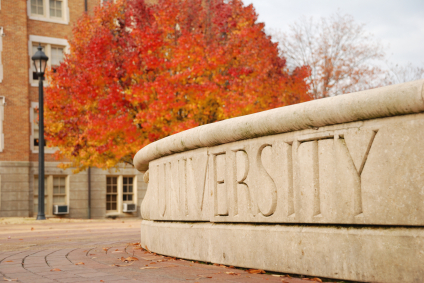College Admissions
College Admissions
Preparing for College
The Best College for You
What to Study
Applications
Education Options
Education Options
Private Universities
Public & State Universities
Community Colleges
Scholarships
Scholarships
African American Scholarships
Latino Scholarships
Native American Scholarships
Women Scholarships
College Grants
College Grants
Federal Grants
Merit Based Grants
Need Based Grants
Student Loans
Student Loans
Federal Student Loans
State Student Loans
No Co-signer Student Loans
Bad Credit Loans
Student Loan Consolidation
College Survival
College Survival
Financial Aid Tips
The Digital Student Blog
They stole the show:
ESPN, The Magazine, reveals the insights of the top 50 high school football recruits.
 Though little information has made its way into mainstream media, ESPN the Magazine has placed a teaser video on the Internet summarizing the key results of their survey of the top fifty high football recruits. Those hoping to feel better about college football or the NCAA will be appalled by what these athletes had to say.
Though little information has made its way into mainstream media, ESPN the Magazine has placed a teaser video on the Internet summarizing the key results of their survey of the top fifty high football recruits. Those hoping to feel better about college football or the NCAA will be appalled by what these athletes had to say.
Perhaps the ugliest comes from the simplest of questions:
– when asked as to the percentage of what college recruiters said to them was a lie the average response from these elite athletes was 61.5%!
But a few other elements certainly disappointed us as well. When asked:
– if you believed nobody would find out, more than a quarter of the athletes (27.6%) indicated they would take a $50,000 payment from a recruiter.
And furthermore:
– more than a quarter of them (26%) also indicated that teammates at their high school had taken some form of performance enhancing drugs.
 When making their official recruiting trips to college campuses:
When making their official recruiting trips to college campuses:
– 57.1% of these elite athletes indicated that drugs or alcohol were available to them during the visit.
And if you thought the sordid Lane Kiffin use of hostesses at Tennessee to recruit players was unusual, consider it common practice:
– 62.7% indicated that the schools recruiting them were using hostesses to try to influence their attendance.
Worse yet:
– 30.5% of them indicated that those hostesses had an impact on their choice.
There was one positive message however. When it comes to the choice of college it is clear that what parents think matters to these athletes:
– more than two thirds (68.4%) responded to the question “if your parents picked a school for you” that it would be the same as their pick.
As for the greatest influence:
– the greatest was by dad at 52.2%, 37.8% said it was mom;
– and just 10% said their high school coach provided their greatest influence (despite the role football was going to play in their college lives).
For all the sordid details, head on over to the ESPN.
Famed fifth grade chorus about to carve another notch into their incredible performance belt.
For Gregg Breinberg the signature life-lesson he wants for his choral students is simple. The energetic director of the PS 22 Internet sensation continuously espouses one fundamental teaching point: with hard work, truly anything is possible.
 Watching his charges on video you get a sense of the effort that he and the students put in each and every day. But even Breinberg had to admit that the group’s latest accomplishment may have been beyond anything he could have expected.
Watching his charges on video you get a sense of the effort that he and the students put in each and every day. But even Breinberg had to admit that the group’s latest accomplishment may have been beyond anything he could have expected.
Internet sensation or not, it is quite another thing to be invited to perform at Hollywood’s night of nights, the evening the Academy recognizes the year’s best cinematic performances.
Selection to Perform at the Oscars
The invitation to perform at the Oscars came to Breinberg a few weeks before Bruce Cohen, one of the show’s two producers, revealed the selection to the chorus. Though obviously proud of his charges, Breinberg admits he was having difficulty matching Cohen’s enthusiasm as the chorus was learning the news. After all, an invitation was one thing.
“There’s no way on God’s green is this going to happen!” Breinberg recalls thinking. “I just chalked it up to being another amazing offer we would have to turn down because I never thought we’d get the approval from the New York City Department of Education.”
It could have been that the Oscars represented yet another level. Or it could have been that after many no’s, the school administration simply had a change of heart. Whatever the case, to Breinberg’s surprise he got the call one week later that the trip would be a go.
All 64 of the fifth graders will be making the trek down the famous red carpet. Fifteen chaperones, all of whom are NYC Department of Education staff, will accompany the youngsters to ensure that the group is present and ready when the curtain goes up on February 27th.
Given how carefully scripted the ceremony is, it comes as no surprise that the chorus will not be performing one of their many eclectic options. Instead, they will sing the Judy Garland classic, Over the Rainbow, a song dictated by the Oscar brass.
But in a testament to Breinberg and his students, the Academy gave the choral director complete freedom to craft the vocal arrangement. And in perhaps the ultimate tribute to the Breinberg’s ability to arrange, the harmonies that he sculpted have been incorporated into the (tentative) score.
Year’s Proudest Moment
Amazingly, for the well-grounded educator, the group’s selection to perform in Hollywood is not listed as his favorite moment of the year. Instead he points to a very emotional day when the chorus had the great fortune to make some music with the boys from Ithaca College.
The Ithacappella visit coincided with the day of the funeral for Breinberg’s 96-year-old grandmother, Bertha Hall. “I was swinging back and forth with a decision on whether or not I should cancel the visit,” explains Breinberg. “In the end, my mom convinced me to keep the engagement, as that is what my grandmother would have wanted.
“She was to me what every person should have in this life, that source of unconditional love,” reveals Breinberg. “So much of who I am I owe to her and I was truly blessed to have her in my life as long as I did.”
Sharp as a tack, “nana” stood an inch shy of five feet in height. And though humility was among her greatest traits, “nana’s” grandson insists she was always sitting the tallest and the proudest at the PS22 Chorus concerts.
“She was a great lover of music and a wicked piano player,” adds Breinberg. “I don’t have a fraction of her chops on the keyboard – but what I do have is all from her.”
As for the decision to go ahead with the Ithacappella engagement, the maestro is thankful. The day became one every music educator can relate to, one of those ‘It’s not about the size of the star, it’s about the music being made and the energy level.’
“Last year, when we sang with Ithacappella, it was a blast. This time it was something more spiritual, as evident in the two groups’ collaboration on Imagine by John Lennon.
“We had no plans to do that song, and the guys just joined in, but it was truly one of those special musical moments that all involved will never forget. And that’s what we’re all about at PS22.”
What’s Next
There is little doubt that fame has not changed Breinberg, the only music teacher on the planet who has told us he has never seen Glee. So if with hard work, truly anything is possible, the question becomes what’s next?
A performance at the Grammy’s? Selection to do the half-time show at The Super Bowl?
 “I want to be the first elementary school chorus to sing on the moon,” pronounces the man dubbed by some reporters as an overgrown fifth grader.
“I want to be the first elementary school chorus to sing on the moon,” pronounces the man dubbed by some reporters as an overgrown fifth grader.
“I think with regard to these extraordinary kids, it’s quite alright to dream big,” chuckles Breinberg. “But in all seriousness, an album and a documentary have to happen for these kids – eventually in some way, shape, or form.
“I’m hoping the Oscars’ appearance has awakened the powers that be to the power of these kids – that they will now allow us to pursue many of the amazing opportunities they’ve turned down for us in the past.”
But for now, the focus is on the Oscars. And though being selected is not yet his favorite moment this year, he acknowledges that seeing the excitement on his students faces when they take the stage could well become his proudest ‘proud papa’ moment to date.
Five steps to ensure that the one who graduates on time is you!
When college graduation rates are published, most people seem to think the vast majority of students accepted to college graduate. But in reality, the current graduation rate for full-time students stands at a miserable 53%.
But wait, it gets worse, since that oft-quoted number is actually the six-year graduation rate. When it comes to four-year graduation rates, i.e., those full-time students who graduate in the requisite four-year timeframe, the percentage drops all the way to 37%. That means roughly two out of every three college freshmen has not earned a diploma four years after beginning school.
 Given the costs of college, it is hard to justify the expense unless you come away with that all-important diploma. And even worse, if you don’t graduate in four years you have made a costly proposition even more expensive.
Given the costs of college, it is hard to justify the expense unless you come away with that all-important diploma. And even worse, if you don’t graduate in four years you have made a costly proposition even more expensive.
If you are going to school full-time, you owe it to yourself and your family to complete your program in four years. Here are five steps to ensure that you meet that goal.
1. Pick the Right College
The first step to a diploma in four years is to select the right college. Unfortunately, selecting a school is not an easy process.
The reason is simple – no one school is right for every student. That is why a student should never select a college based simply on name recognition, reputation or selectivity, the caliber of its football team, or the fact that classmates or other family members will or have attended that school.
To select the right college, you must do your homework. Your selections should be based on at least three critical elements, the location of the school (urban, sub-urban, or rural), the specific academic program offered (consistent with your career and academic interests) and the non-academic, cultural-based, on-campus activities (consistent with your personal interests).
The best way to tell if a college is right for you is by making a campus visit. Spending a few hours on campus, visiting classes, meeting students and observing the culture will give you a real sense of whether or not you will fit in there.
At the right school, you will feel a real sense of excitement about what it would be like to attend classes there. College is incredibly challenging, academically and emotionally. Therefore, it is essential your school help bring out the very best in you.
That won’t happen if you are on a tiny campus where everyone knows everyone else and you actually crave anonymity. Likewise, the anonymity provided by a large state school may be unsettling to someone who wants to get to know each of his or her classmates.
 Ultimately, choosing a college is all about what is the best fit for you. If you don’t do your homework, you will find out very quickly first semester freshman year if you made the wrong decision.
Ultimately, choosing a college is all about what is the best fit for you. If you don’t do your homework, you will find out very quickly first semester freshman year if you made the wrong decision.
Should you make the wrong choice, it is not only possible to correct the mistake; you owe it to yourself to correct it. But it will cost you precious time and will likely mean the four-year plan is done.
2. Pick the Right Major
Picking a major is even tougher than picking a school mostly because there is no real consensus as to how to determine what is right for you. That is truly a personal matter for the individual choosing.
Moreover, while some students start college knowing exactly what they want to major in, many others are torn between many subjects that interest them greatly. In fact, most college counselors will tell you that uncertainty tends to be the norm and that the vast majority of students change their majors multiple times.
Ultimately, you must discover what it is that you are passionate about. First you will do much better in those classes that you’re interested in. Second, it is much easier to study and work on materials in those courses that motivate you.
This in turn translates to the critical time when you graduate – you don’t want a job, a place where you have to go to work to earn a paycheck. Instead what you want is a career, a place where you get paid to do things you are truly interested in and enjoy doing.
Therefore you should not pick a major based simply on the notion that jobs in that field pay well or gain a certain level of prestige. Knowing you will make gobs of money one day will not necessarily help you deal with the challenges of those classes today. Likewise, if you don’t care for the work involved, the paycheck will not make up for your level of unhappiness.
It is important to note that some people are unable to narrow their choice to one major so they construct a path towards a dual option. Other students pursue a major and a minor, or sub-focus.
But if you have no idea at the outset, that is not necessarily a problem. At most four-year colleges, you aren’t required to declare a major until the end of your sophomore year.
Therefore, if you are not sure, don’t pick something at random. Selecting the wrong major can be a step backward in the overall goal of finishing in four years. Instead go without specifying a major and select a general program that allows you to initially take courses to see which areas you might be interested in studying deeper.
For more on the choice of major we suggest you visit the College Board.
3. Enlist the Help of Your Advisor
 Though college is extremely expensive, one positive is the enormous set of campus resources available. One particular resource every student must take advantage of once they have enrolled in a specific school is their faculty advisor.
Though college is extremely expensive, one positive is the enormous set of campus resources available. One particular resource every student must take advantage of once they have enrolled in a specific school is their faculty advisor.
These individuals are assigned a caseload of students and expected to provide both academic and general education guidance. Your advisor will be able to help you refine your goals, your academic focus (including help with choice of major), help you locate key resources, and are expected to monitor your progress toward your educational and career goals. They can also help you with the extremely difficult transition from high school to college.
During your first two and a half years, these individuals can help you create a course schedule, keeping track of required prerequisites and contrasting your needs with the master calendar of courses that are offered. Without this guidance, students may find that certain prerequisite that must be completed for first semester junior year may not be offered second semester of the sophomore year and thus must be taken earlier in the student’s yearly schedule. Not knowing could lead you to miss a key progression that ultimately prevents you from completing your program in four years.
In addition, if you are unclear as to what you want to major in or begin to have second thoughts about your choice of major, your advisor will not only be a great resource for helping you identify what you might want to consider instead. In the case of the person who is undeclared as to a major, your advisor can help design a broad-based general program that leaves you ample openings the last two years to move into a selected major. In the case of making a change, your advisor will be able to examine the specific repercussions of a change and help you mitigate the impact.
During the latter part of your junior and all of your senior year, these individuals will serve as the first resource for that even bigger transition – when you complete your program and begin your career. At the same time, college operates on a you-need-to-be-an-adult basis. Your advisor will not be required to schedule such appointments. In fact, he or she will expect you to seek him out when the need arises.
The University of Chicago web site has some great advice on how often you should meet as well as the proper protocols for setting up sessions.
4. Attend Class
 One of the major differences between high school and college is that attendance is not mandatory in most college courses. While a few professors may include attendance and class participation in your final grade, most will not.
One of the major differences between high school and college is that attendance is not mandatory in most college courses. While a few professors may include attendance and class participation in your final grade, most will not.
The extra freedom is one of the great things about college. But with that freedom comes great responsibility.
The quickest way to extend your post-secondary years is to either drop or fail classes. After all, the sheepskin comes only when you have accumulated the requisite number of credits.
There is no doubt that class attendance facilitates the learning process. First the professor will present material that will supplement and elaborate on the readings and other written assignments. Those presentations can be essential to understanding difficult material.
Second, the discussions of your peers regarding the material are both enlightening and motivating. In fact, most students soon realize that the lack of interaction that often occurs with online courses makes it very difficult to maintain your enthusiasm.
Mississippi State University has collected data for eight years and found that the No. 1 predictor of academic success for freshmen was regular class attendance. Furthermore, MSU found a full grade-point difference between those who go to class (2.7 on average) and those who have attendance problems (1.7).
Michigan State University, the University of Minnesota and Minnesota State University all have published results that tie class attendance with course performance.
At the University of Alabama, Birmingham (UAB), they turn to the great philosopher Woody Allen for this basic advice:
“Eighty percent of success is showing up.”
5. Study Dammit!
This should go without saying – the surest way to extend college is to receive D’s and F’s in courses. Unlike high school, all college courses have extensive rigor and significant work demands. Cruise control is not likely to cut it unless you are a distant cousin to Albert Einstein.
To be successful, you must not only find time to study, you must make a commitment to doing so. First and foremost, that means finding a quiet place where you can focus on the task at hand. And for most, that means getting out of their dorm room.
 The second element involves good time management skills. Studies show that studying in shorter chunks of 20-50 minute time periods followed by a brief break of 10 minutes is far superior to multi-hour sessions. Furthermore, the most challenging work should be done as early in the day as you can get to it. The more the day progresses, the more you get tired and your concentration level drops.
The second element involves good time management skills. Studies show that studying in shorter chunks of 20-50 minute time periods followed by a brief break of 10 minutes is far superior to multi-hour sessions. Furthermore, the most challenging work should be done as early in the day as you can get to it. The more the day progresses, the more you get tired and your concentration level drops.
That means you should rank your classes according to difficulty. For the two or three hardest classes, you should schedule some time every day to work on them, again focusing on working on the most difficult as early in the day as possible.
Lastly, use the self-quizzing method that is so espoused by college professors. That means frequently closing the book and your notes and trying to recite the key concepts aloud.
Many people seem to believe that college is just an extension of high school. Actually, nothing could be further from the truth.
In fact, we would insist that college ain’t nothin’ like high school.